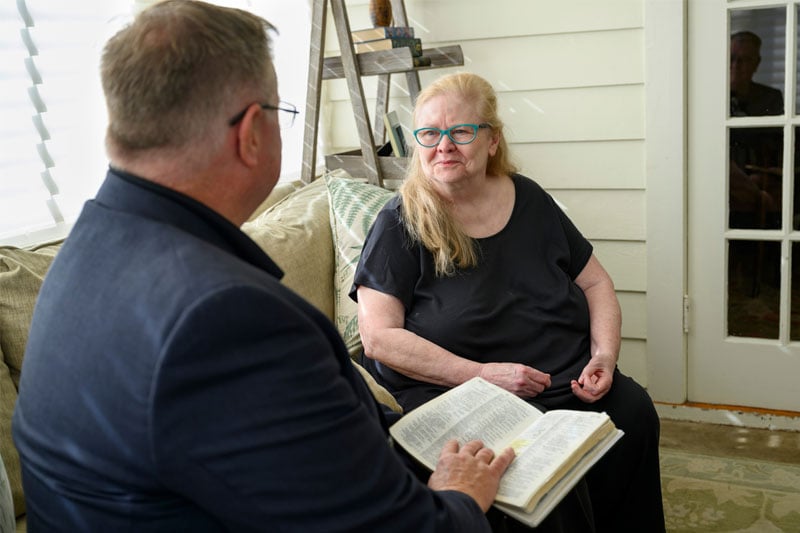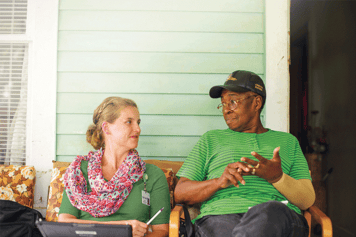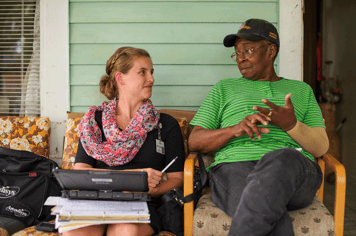Throughout our lifetime, we are bound to encounter an experience with grief. This may come from the death of a loved one, the loss of a job, an end of a relationship or any change that alters your life. There is no one right way to grieve and the process of healing may not be linear, depending on your own personal experience and journey. You may cry, become angry, withdraw or feel alone, but it’s important to remember that these are all normal and valid feelings.
Although everyone can grieve differently, there are typically five stages of grief or emotions one feels when suffering the loss of a loved one.
[action 1]
The 5 Stages of Grief
In 1969, Elizabeth Kübler-Ross, a Swiss-American psychiatrist wrote the book “On Death and Dying” and detailed that grief could be divided into five stages. Her findings came from years of working with terminally ill patients. The five stages of grief may not thoroughly reflect every individual's experience as everyone has their own healing journey and emotions can come and go.
The five stages of grief are now known as the Kübler-Ross model, and while it was originally created for people who were ill, the stages have been adapted for those experiencing loss.
Stage 1: Denial
When healing from the loss of a loved one, it can take time to accept that you’ve experienced a significant loss. Denial may be used as a coping mechanism because you refuse to believe the truth. You may want to feel like your loved one will walk through the door at any moment, answer your phone call or call you back. It can be hard to admit that life will no longer be the same or appear how it used to be.
Denying that your loved one has passed away gives you more time to process and absorb the news; however, as you move out of denial, the emotions you’ve been hiding will resurface and you’ll be faced with immense sorrow.
Other symptoms of denial may look like:
- Pretending your loved one is on vacation and will be back soon.
- Continuing to speak about your loved one in the present tense.
- Busying yourself with work or other tasks instead of trying to heal.
Stage 2: Anger
Anger hides many of the emotions and pain you carry and can often be directed towards other people. This can manifest as blame or feeling that someone else is at fault for the death of your loved one. However, it is a natural response to loss and can be directed towards a variety of people and even objects.
Examples of the anger stage may include:
- Directing your anger towards God for letting this happen.
- Becoming angry at the guy in line who looked at you the wrong way.
- Becoming angry at first responders or doctors for “letting” your loved one die.
As anger resolves, you may start to think more rationally about your emotions and the pain or feelings you’ve been trying to avoid.
Stage 3: Bargaining
The bargaining stage of grief can happen before and after your loved one has passed. Before your loved one has passed, many direct their efforts towards a higher power who may be able to influence a positive outcome. This can be, “If my sister can beat cancer, I promise I will never argue or fight with her again” or “If my husband recovers from cancer, I promise I’ll start going to church every week.”
Bargaining after your loved one's passing can turn to the form of “if only” statements or feelings of guilt. This can look like:
- “If only we’d gone to the doctor sooner, maybe they would’ve caught it before it was too late.”
- “If only we would’ve gone to a different doctor, they would’ve caught the cancer ahead of time.”
Bargaining is a type of mental game where you try to control and undo something that is not in your power, nor control. You tend to think of your own faults or regrets with loved ones who passed away and wish you could have behaved or done something differently to not be in an emotionally painful place in your life.
Stage 4: Depression
In the fourth stage of grief, emotions and imaginations will calm down and slowly start to realize the reality of what life without your loved one looks and feels like. Feelings will become unavoidable, and you have to fully come to terms with life after loss.
Although this is a very natural state in the grieving process, it can also be the hardest. You may pull yourself closer towards sadness allowing it to worsen and grow, becoming less social, no longer reaching out to others for help, losing hope for the future or becoming confused about life.
Dealing with depression after the loss of a loved one is not the same as major depressive disorder, a mental health condition which combines a number of emotional, cognitive and physical symptoms. Please reach out to a mental health specialist or the grief support team at Amedisys to find the next support group session.
Stage 5: Acceptance
The sadness and pain you feel after losing a loved one may never fully go away. Living with acceptance after loss allows you to be thankful for the beautiful memories and shared experiences you and your loved one were able to create together. You must accept the finality of what has happened. No more new beginnings, exchange of words, love, care or advice, but you can hold onto the beautiful memories and maintain hope for the future.
As you consider the five stages of grief, it’s important to remember that everyone grieves differently. Some may move through all five stages of grief and others may skip a step. There is no correct amount of time that it takes to grieve, potentially taking weeks, months or even years. You may also take a step backwards in the grieving process before you can fully move forward. Give yourself grace and patience as you navigate your feelings in dealing with loss.
What Does Grief Do to Your Body
There are many layers of the grieving process and researchers have made clear connections between grief and its effects on heart health, sleep patterns, moods and more. Many believe that grief is just the feeling of emotions, but there are also several physical side effects of grief.
Digestive Problems and Weight Change
Digestive problems and weight changes are often experienced by those experiencing grief. Grief can cause temporary digestive problems such as constipation, diarrhea, stomach pain, a “hollow feeling” in the stomach or nausea.
It’s also common to gain and lose weight because of grief. In the days, weeks and even months following death, you may fail to exercise, lack personal care, eat more take out or overeat, resulting in weight gain. On the other hand, you may experience loss of appetite or fail to eat regular meals.
Pain, Discomfort and Illness
Grief can induce other physical symptoms including genuine pain and discomfort, such as headaches or migraines, chest pains, joint aches or muscular pain.
Immune systems can also be suppressed, causing you to be more susceptible to viruses and infections.
Sleep Problems
Insomnia can be a common side effect of grieving, affecting physical coordination, cognitive function and blood pressure. Sleeping too often can take away your energy and leave you feeling lethargic.
Common Misconceptions About Grief
As this article demonstrates, there is no right or wrong way to grieve. Everyone goes through their own journey to reconcile loss.
Here are the most common myths about grief:
If you ignore grief, it will go away
Grief is a very complex and natural response to the loss of a loved one. You must go through it by accepting and adjusting to your new reality by moving forward and not ignoring your feelings. Allow yourself to feel your sadness and sorrow and process your grief. There is no way to heal if you avoid it.
Grief always ends after a specific amount of time
For many people, grief will never fully go away, it just becomes easier to accept that your loved one is no longer here.
However, grieving in the same way over a period of time may be known as prolonged or complicated grief. In the first few months after a loss, it is more than normal to have intense emotions of sadness that make it hard to live in your everyday routine. But that typically subsides as you adapt to your new circumstances. Living with prolonged grief allows the grief to remain center stage in your life limiting your ability to do anything else wholeheartedly.
There are good ways and tools that provide support to help move along in your grieving process. Be kind to yourself and remember that there’s nothing wrong with grief and you may just need more guidance and healing.
The Grieving Process is Always Linear
Grieving individuals may try and push through their grief in a linear fashion, but that’s typically not the case. Grief is more cyclical, and you have a series of ups and downs no matter how much time has passed. For example, there may be certain dates that activate memories and bring back feelings.
How Amedisys Provides Grief Support
Hospice bereavement services are provided by trained and experienced staff members, including chaplains, social workers and bereavement coordinators. These professionals are a core part of the Amedisys hospice care team and focus on emotional and spiritual support.
What role do each of these team members play in helping loved ones navigate through loss?
- Chaplains and spiritual counselors can help loved ones find meaning and peace after their loved ones passing while discussing faith or mindfulness in a way that resonates with everyone's set of beliefs.
- Hospice social workers help loved ones connect with community resources and help them cope with their feelings surrounding death.
- The bereavement coordination team completes emotional, psycho-social and spiritual assessments and coordinates the plan of care and grief support as desired by loved ones.
Bereavement support services can start as soon as your loved one enters hospice care in preparation for their death and continue after their passing. It’s important to openly discuss the loss of your loved one to understand what they consider to be a good death and to ensure that you know what their wishes are. Our bereavement team at Amedisys can help you have these hard conversations and guide the way for your loved ones wishes to be honored.





